I had an unforeseen issue with a sub going down (generic error, was probably a connection issue) and now that I've reconnected the sub it is insanely slow re-syncing. It seems to download about 1000 changes then sit there for about an hour before adding another 1000.
Any ideas why this is going so slowly? This is just one table of dozens and I feel like this won't catch up before Monday (when I have users meant to be coming online).
Any help is appreciated! Thanks!
UPDATE
It's been running for over 24 hours now and is slowly chewing through the records but at a still very slow pace. It now toggles between the shot above and 'Enumerating changes in filtered articles using Subscriber's assigned partition ID'. Yes, there is a filter in place but it's been there since I first set up replication and has never caused an issue before.
SECOND UPDATE
When I go into Replication Monitor there is an error:
The replication agent has not logged a progress message in 10 minutes. This might indicate an unresponsive agent or high system activity. Verify that records are being replicated to the destination and that connections to the Subscriber, Publisher, and Distributor are still active.
But what is strange is that there is zero system activity and I have another subscriber on this publication working as well a secondary replication from the same publisher to the same subscriber that is working perfectly. I've tried stopping and restarting, taking and applying a fresh snapshot but nothing seems to work. There are no blocked processes, no active queries that are deadlocking or anything else I can think to check.
To be clear:
- Publication A => Sub 1: WORKING
- Publication A => Sub 2: NOT WORKING
- Publication B => Sub 1: WORKING
- Publication B => Sub 2: WORKING
If anyone has any help, I'd much appreciate it.

